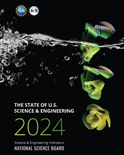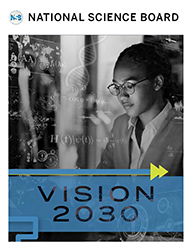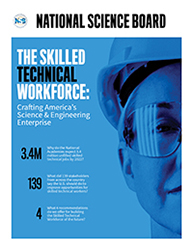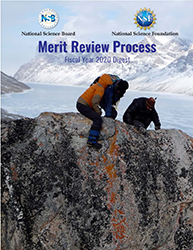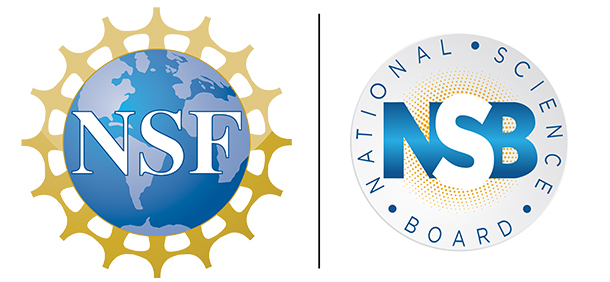
National Science Board to meet virtually February 23 - 24, 2021
Roadblocks in STEM graduate school, NSF’s Racial Equity Task Force, harassment policy, plans to reach the “Missing Millions,” strengthen research, translation, innovation, and partnerships, and other NSB Vision priorities are on the agenda

Speakers for NSB’s panel on roadblocks to STEM graduate student retention (Credit and Larger Version)
February 18, 2021
The National Science Board (NSB) will meet virtually February 23 - 24, 2021 to address science and engineering policy issues relevant to the National Science Foundation (NSF). The public meeting agenda is available here: https://www.nsf.gov/nsb/meetings/2021/0223/meeting.pdf
Open meeting sessions will be livestreamed via YouTube. Links for each meeting day are below.
TUESDAY, February 23, 2021
Livestream YouTube link: https://youtu.be/6JjWhwMhIKM
NSB Plenary (11:00 AM – 1:05 PM)
The meeting will kick off with a ceremonial swearing in of its newest members, Matthew Malkan and Scott Stanley. NSF staff will give updates on the agency’s Racial Equity Task Force and NSF’s harassment policy. NSB Vice Chair Victor McCrary will report on activities of the Vision Implementation Working Group.
Committee on Oversight (1:15 – 2:25 PM)
Committee members will discuss two draft NSB resolutions. One aims to address unconscious biases and improve the preparedness of reviewers in the merit review process. The second would enhance Committee of Visitors' ability to offer suggestions that improve Broader Impacts review.
Also on the agenda: NSF Inspector General Allison Lerner will give an investigative update on foreign influence and on management challenges facing the agency and NSF Chief Financial Officer Teresa Grancorvitz will provide an update.
Committee on Science and Engineering Policy (2:35 – 3:25 PM)
Agenda items include an overview of the impact of Science and Engineering Indicators 2020, an update on 2022 Indicators, and pending policy briefs.
WEDNESDAY, February 24, 2021
Livestream YouTube link: https://youtu.be/tmiQwe7o_Y0
National Science Board Plenary (11:00 – 11:45 AM)
A panel of external experts will discuss roadblocks to retention of graduate students in STEM. The panel is part of a series to gain insights about challenges in STEM and advance priorities of Vision 2030.
Organized by NSB External Engagement Chair Geraldine Richmond and hosted by former NSB member and AAAS CEO Emeritus Alan Leshner, the panel will feature:
Kenneth Gibbs: Roadblocks to finishing graduate school. Gibbs is Chief, Undergraduate and Predoctoral Cross-Disciplinary Training Branch at the National Institutes of Health.
Renetta Garrison Tull: Mentoring for STEM graduate students. Tull is Vice Chancellor for Diversity, Equity, & Inclusion at the University of California, Davis.
Suzanne Ortega: Broad training for STEM graduate students. Ortega is President of the Council of Graduate Schools.
Celina Gray: Journey of a current STEM graduate student. Gray is Blackfeet/Métis and a Master’s student in wildlife biology at the University of Montana.
Committee on Strategy (11:45 AM – 2:15 PM)
Agenda items include an update on NSF’s fiscal year 2021 current plan and discussion of the agency’s pending 2022-2026 Strategic Plan. NSF staff will present on the agency’s efforts to address the “Missing Millions,” translation and innovation activities, and plans to strengthen foundational research.
Committee on Awards and Facilities (3:25 – 3:45 PM)
NSF will give an update on how COVID-19 is impacting the U.S. Antarctic Program.
Committee on External Engagement (3:45 – 4:05 PM)
The Committee will discuss activities underway to engage on Vision 2030 goals.
NSB Plenary (6:15 – 6:40 PM)
Board members will vote on two Broader Impacts resolutions. Committee chairs will give reports from open sessions and the NSF Director will provide senior personnel updates.
Closed Sessions
The Committee on Strategy will discuss NSF’s FY 2022 budget request.
The Committee on Awards and Facilities will discuss an action to extend the initial operations award for the National Ecological Observatory Network and will consider an award action for two final projects of the Mid-scale Research Infrastructure Track 2 awards. Also on the agenda: a request to authorize use of additional management reserve funds for construction of the Daniel K. Inouye Solar Telescope, updates on a spending cap increase for the Gemini Observatory, and next steps on the Arecibo Observatory.
During Closed Plenary, NSF will give an update on budgetary allocations for COVID-19 relief and the NSB will vote on two resolutions: Mid-scale Research Infrastructure – 2 Awards and DKIST Management Reserve. During Closed Executive Plenary, NSB will select a replacement for its Executive Committee and vote on membership for its ad hoc Nominations Committee. NSF Director Panchanathan will give updates on senior personnel and discuss his vision for NSF’s translation, innovation, and partnerships work.
About the National Science Board
The NSB identifies issues critical to NSF’s future, establishes its policies, and serves as co-head of agency with the NSF Director. The Board also advises the President and Congress on policy matters related to science, engineering and education. Selected for their distinguished service and accomplishments in academia, government, and the private sector, the Board’s 24 presidentially-appointed members are leaders in science, engineering, and science, technology, engineering, and math (STEM) education.
Media Contact: Nadine Lymn, National Science Board, (703) 292-2490, nlymn@nsf.gov
Useful NSB Web Sites:
Home Page: http://www.nsf.gov/nsb
Media Contact: http://www.nsf.gov/staff/staff_bio.jsp?lan=nlymn&org=NSF
News: http://www.nsf.gov/nsb/news
Meetings: http://www.nsf.gov/nsb/meetings
Publications: http://www.nsf.gov/nsb/publications
Facebook: https://www.facebook.com/NationalScienceBoard
Twitter: Twitter: https://twitter.com/intent/user?screen_name=NSF_NSB
YouTube: https://www.youtube.com/channel/UCkrHRzuGSrPp2haQs0T_Pww
To view PDF documents, please download Adobe Acrobat Reader.
